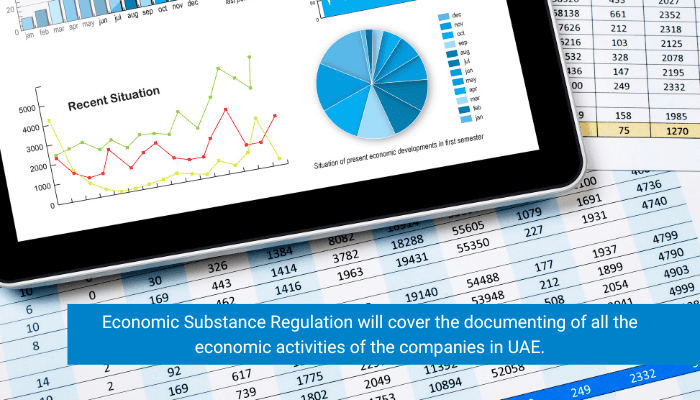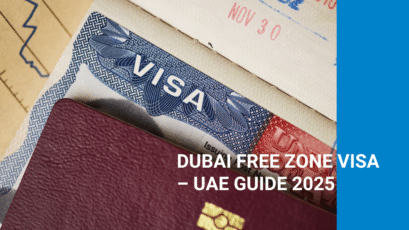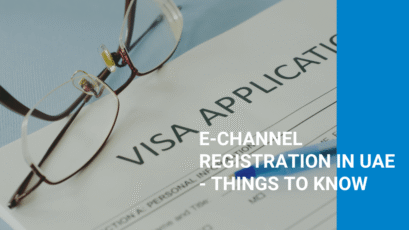Economic Substance Regulation (ESR) is made mandatory in UAE for all companies operating in the region subject to certain criteria. ESR Filing in UAE is a mandatory operation every business operating in the strategic sector such as banking, finance, ship channeling, finance, distribution centers, and more.
The introduction of the Economic Substance Regulation has initiated the removal of the UAE from the blacklist category of the European Union (EU). The Code of Conduct Group on Business Taxation removed UAE from the blacklist on 10 October 2019.
It is an additional compliance requirement for a few business activities in UAE. It raises the international investors’ confidence in UAE as a business hub.
Table of contents – ESR
- Economic Substance (ES) Regulations and Guidance
- How will UAE benefit from the Economic Substance Regulations?
- Changes to Definition of “Relevant activities”
- Governance of Economic Substance Regulations
The Ministry of Finance oversees the Economic Substance Regulation (ESR) filing and reporting by companies in the UAE. UAE aims at becoming a global trade hub and complies with OECD’s and European Union’s international standards of taxation.
ESR Registration in the UAE mandates companies operating in certain sectors to provide the required details to the governing authorities. Similarly, offshore jurisdictions such as the Cayman Islands, British Virgin Islands, Bahrain, etc., are also compliant with ESR legislation.
Economic Substance (ES) Regulations and Guidance
Economic Substance Regulation will cover the documenting of all the economic activities of the companies in UAE. Also, the branch companies and representative offices will fall under the purview of ESR. (including those based in any of the UAE’s Free Zones).

The following business activities fall under the scope of ESR Regulatory requirements. Companies operating the below activities will have to file the ESR report regularly with the authorities.
- Banking
- Insurance
- Fund Administration
- Finance and Leasing
- Headquarters
- Shipping
- Holding Company Business
- Intellectual property business
- Distribution centers
Additionally, companies conducting activities that are not on the above list are outside the scope of ESR regulations. However, all companies in UAE irrespective of whether they perform a relevant activity or not must provide company information to the regulatory authorities on demand.
ESR Timelines
- ESR Notification – maximum of 6 months after fiscal year
- ESR Reporting – maximum of 12 months after fiscal year
For preparing the ESR Registration form, the company must furnish certain details about their office space, employees, director board, operations in UAE, and some financials generated over the current and previous financial year.
Distribution and Service Center Business under Economic Substance Regulation in UAE
All companies that belong to the following business activities must file and report their Economic Substance in UAE to the authorities as per the guidelines. These business activities are broadly categorized into Distribution and Service Center businesses for ESR.
- Purchasing goods from a Foreign Connected Person and importing, and storing them in UAE.
- The purchase could be in any form such as Components, or raw Finished goods, goods ready for sale, and reselling the parts or goods outside of the UAE
- Providing Services to Foreign Connected Persons in connection with a business outside of UAE.
Detailed Activities that fall under the Distribution and Service Center Business
Following are the detailed activities that are categorized as Distribution and Service Center business as per the Economic Substance Regulation guidelines:
- Import Export from Foreign Connected Person to UAE – Transporting and storing parts, materials, and goods ready for sale
- Managing inventories in a UAE warehouse – Checking stock levels, managing the frequency of stock replenishment, etc.
- Taking orders – Order processing, fulfillment of products, and distribution of goods in UAE
- Providing consulting or other administrative services to entities in UAE and Outside
Who is Subject to the Economic Substance Regulations?
Business entities in UAE are subject to Economic Substance Regulations complying with certain criteria. The ES Regulatory authority requires companies to provide the ESR submission in cases such as:
- Whether they conduct any of the relevant activities in the UAE?
- Whether part of their income is taxable outside UAE?
- Is the core business income generation taking place in the UAE?
Companies in the above categories must submit the ESR Report to the regulatory authority. Also, it must include all the information as per the compliance standards of Economic Substance Regulations.
Economic Substance Test – Criteria
The companies must clear the Economic Substance Test by furnishing all the information and filling up the questionnaire.
The entities performing relevant activities in the UAE must meet the following test:
- Does the company conduct core income-generating activities within the UAE?
- Is the business having directors and management in the UAE?
- Does the company have an adequate number of qualified staff to perform activities physically present in the UAE?
- Is the company incurring an adequate level of operating expense in the UAE
- Does the company have an adequate physical asset in the UAE?
Impact on the Corporate Entities based in UAE
Companies operating in UAE with a full-fledged operating model, staff, and office space will have the minimum impact from ESR. It will be added documentation for the accounts or finance team.
International companies having minimum staff and conducting the relevant activities as per ESR compliance will have to closely review the Governance structures. Business entities must ensure that financial management is conducted in accordance with ES requirements.
Similarly, corporates operating under the relevant business activities with improper accounting standards will have to gear up. Failing to comply with the reporting standards, and physical & economic presence will result in penalties from the authorities.
How will UAE benefit from the Economic Substance Regulations?
UAE is aiming to become a fully compliant international financial hub with perfect taxation mechanisms in place. The new ESR regulations are aligned with the OECD BEPS (Base Erosion & Profit Shifting) inclusive framework.
Base erosion and profit shifting (BEPS) is a tax planning strategy that multinational companies leverage for tax savings. However, BEPS practice cost significant revenue loss for many countries.
Hence, the OECD framework is developed and it is a collaboration of over 130 countries to implement measures to tackle tax avoidance. It will also improve the international tax rules and ensure a more transparent tax environment.
UAE has multiple advantages when it comes to starting a business and growing trade. It has advanced technology, internet penetration, availability of labor, a growing business ecosystem, and more.
The new developments will help drive more foreign investment and enhance the image of the UAE as a major business center of the Middle East.
Economic Substance Regulation in UAE – Amendments to be Noted for Entrepreneurs
The Economic Substance Regulation was amended in August 2020 by the UAE Cabinet of Ministers.
The Amendments have eased a few regulations of the Economic Substance filing (physical presence & operations in UAE) for Companies operating in UAE under a few specific categories (Relevant Activities as per ESR Compliance).
Definition of a Licensee
The amended ES Regulations only apply to Licensee – judicial persons, and unincorporated partnerships that carry relevant activity in the UAE.
Changes to the Economic Substance Regulation in UAE
- Natural persons, sole proprietors, trusts and foundations are no longer considered as ‘Licensees’ under the scope of ES regulations (Previously these groups were added).
- Companies or owners under the specified group need not file a notification or satisfy the Economic Substance Test.
- There are amendments to ESR on the way of treating UAE based branch of a company and Foreign Branches.
Applicable Exemptions from Economic Substance Regulation
- Entities that are Tax Resident outside the UAE
- Investment Funds does not come under ES regulation filing.
- Businesses that are completely owned by UAE Residents and not part of any Multi-National Group and only operates in UAE
- UAE Branches of a foreign company whose income is subjected to tax in the home country of the foreign company
All the exempt entities must file a notification and provide substantial documents to benefit from the exempt status.
The companies in UAE must be having a Tax Residence Certificate and the foreign companies at the home country that will provide the proof as a tax resident in a respective country where the business is operational.
Government or Semi-Government Entity – Exempt from ESR
All government or semi-government entities in UAE are exempt from ES regulations in UAE.
Changes to Definition of “Relevant activities”
1. Distribution and Service Centre Business
There is no requirement for Companies in UAE to import and store goods to be known as a “Distribution and Service Centre Business”
Also, the company need not be providing services outside UAE to a foreign-related party to be considered in UAE as a “Distribution Service Centre Business”
2. High-Risk Intellectual Property Licensee
Businesses that meet the following criteria come under the ‘High-Risk Intellectual Property Licensee’
- The business has not created the Intellectual Property (IP) but has acquired the IP Asset.
- The IP Assets can be obtained by either:
- Connected Person, or,
- For funding research and development by another person situated in a foreign jurisdiction
The IP Company has either sold the IP asset to a connected person or earns an identifiable income from the Foreign Connected Person in return of using the IP rights.
Changes to the definition of a ” Connected Person” and introduction of a new definition of a “Group”
The amended ES regulations define a Connected Person as an entity that is part of the same group as the Licensee or the Exempted Licensee.
A group is defined as ” two or more entities related through ownership or control such as that they are required to prepare consolidated financial statements for financial reporting purposes under the accounting standards.
3. Treatment of Branches
Branches are not regarded as Licensees as they don’t have a separate legal personality from their parent or head office company.
The Parent or head office companies must comply with the ES regulations by stating the following:
1. Branch of a UAE Company
The UAE Company must file a single notification and an Economic Substance Report (if applicable) to state the relevant activities of the company and its branches in UAE.
2. UAE branches of a Foreign Company
The UAE branch is not subject to the ES regulations if the relevant income is reported in the tax return of the foreign company in the home country.
3. Foreign Branch of a UAE Company
The UAE business need not report the relevant activities of the foreign branch in UAE, provided the foreign branch is subject to tax on its relevant income in the foreign jurisdiction.
Governance of Economic Substance Regulations
The UAE Federal Tax Authority is the Assessing Authority for the ES Regulations. FTA will be enforcing the compliance of UAE Business with the Economic Substance Test.
The Regulatory Authority will collect and verify the information regarding the Licensees and update the systems to ensure the entities in UAE are compliant to ES Regulations.
Exchange of Information
The Ministry of Finance (competent Authority) as per amended ES regulations will exchange information either the Foreign Competent Authorities on Licensee that claims to be exempt from the ES regulations based on:
- Being a Tax Resident outside the UAE; or,
- Being a UAE Branch of a foreign entity whose income is subject to tax outside of the UAE
Economic Substance Filing – Notifications
The notification for ES regulations must be filed electronically on the Ministry of Finance Portal within Six months of the financial year-end
Any delay in filing and complying to the Economic Substance regulation test for Licensees falling under the relevant activity bracket will levy fines.
Additional Clarifications
- The Licensee is not required to perform all the Core Income Generating Activities listed in the ES regulations for a particular relevant activity. However, the activities that generate income must be performed in the UAE
- There is no requirement for board members/ directors to be physically present in the UAE when taking strategic decisions on daily operations.
- A Licensee may outsource activities that are not Core Income Generating Activities to parties outside the UAE.
- Outsource Activities such as back-office functions, IT, Payroll, Legal services, or any expert professional advice, specialist services, etc.
- The amended ES Regulations and Guidance provide clarity on the scope and application of the Economic Substance requirements in the UAE.
- Also, the clarifications regarding the treatment of branches are helpful to businesses operating in the UAE in planning their tax savings accordingly.
UAE Entities must assess their business activities and ensure they fall within the scope of the Economic Substance Regulations, and meet the Economic Substance Test requirements and comply with the ES regulations to avoid any penalties.
To know more about Economic Substance Regulations and ESR Registration, talk to our expert Business Consultants right away!











